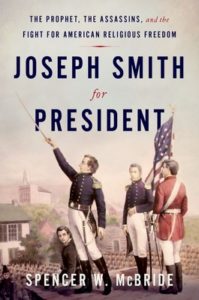 Title: Joseph Smith for President: The Prophet, the Assassins, and the Fight for American Religious Freedom
Title: Joseph Smith for President: The Prophet, the Assassins, and the Fight for American Religious Freedom
Author: Spencer W. McBride
Publisher: Oxford University Press
Genre: History
Year Published: 2021
Number of Pages: 296
Reviewed by Erik Champenois
Joseph Smith for President covers Joseph Smith’s candidacy for U.S. president, especially in the context of the history of American religious freedom (or the lack thereof), with Mormons being one example among others of a faith group experiencing an infringement of religious freedom not usually experienced by (and indeed enacted on them by) the more culturally acceptable mainstream Protestant churches.
McBride covers some of the relevant LDS Church historical background before delving into more detail on the Missouri persecutions and the Church’s Nauvoo era. He reviews Joseph Smith’s unsuccessful appeals for recompense and protection by both the U.S. President and Congress, and his letters to 1844 presidential candidates requesting their responses to whether and how they would protect the members of the Church. Seeing no success from either effort, Joseph Smith decided to run for President, as a way of bringing attention to the plight of Church members more than as a realistic candidacy (some members thought divine intervention made a presidential win possible though not otherwise likely). McBride successfully shows how Joseph Smith’s candidacy for President was just one way among others that Joseph Smith and the Church sought better protection for itself. The Nauvoo Compact was another effort, though one that was starting to show fragility in response to state and interstate public opinion and legal efforts to extradite Joseph Smith. More importantly, the Church reviewed the possibility of moving to either California, Oregon, Washington, or Texas – considering even leaving the country (these areas not being part of the U.S. at that point) – all while continuing to bet on the possibility of being able to get a public hearing through the presidential election of the country they were considering leaving.
McBride covers Church interactions with public officials and presidential candidates quite well, as well as the actual political positions Joseph Smith campaigned on and the efforts of electioneering missionaries campaigning for him. He also covers the influence of the Council of Fifty in the presidential campaign, and Joseph Smith’s ideas about theodemocracy and the political kingdom of God. Since the book frames itself in the context of religious liberty, there’s not as much of an emphasis on this political theology and kingdom-building as I would like – it would have been interesting to read up more on this theme including connections with other relevant examples of utopia- and kingdom-building in early American history. McBride also only lightly covers polygamy. What McBride focuses on, however, he does really well, providing a more thorough and contextualized history of Joseph Smith’s candidacy for the presidency than anything I’ve previously read.
